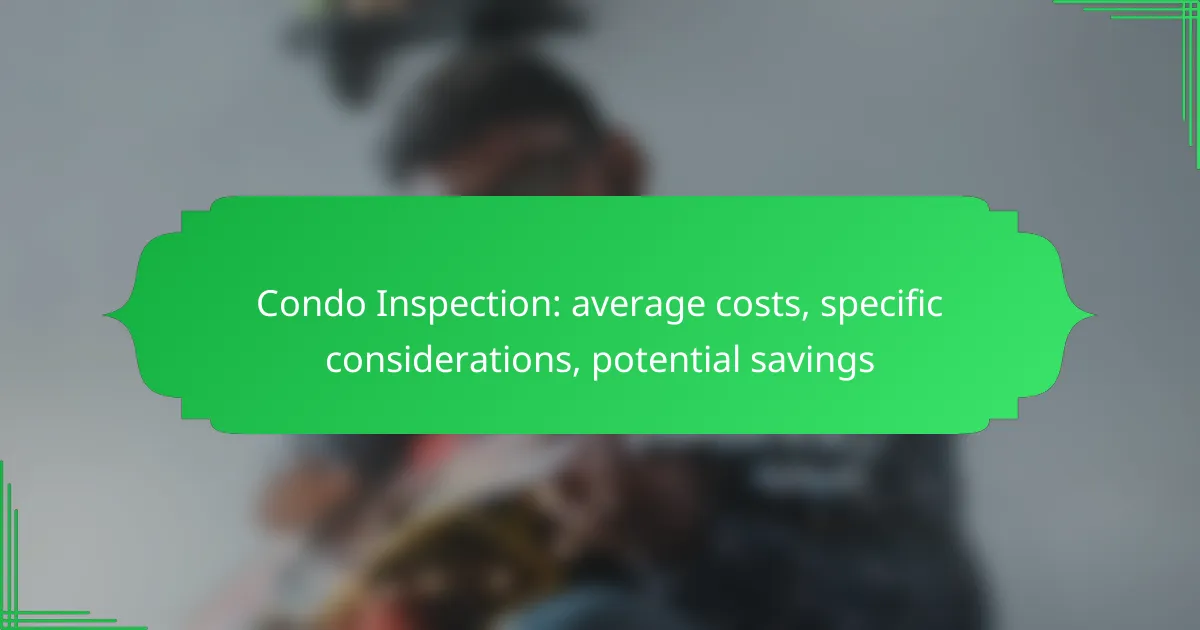When considering a condo purchase, understanding the average costs of inspections, which typically range from $300 to $500, is essential. Factors such as size, location, and specific services can influence these prices, while unique considerations like shared spaces and HOA regulations play a crucial role in the evaluation process. By being informed and strategic, buyers can also explore potential savings through negotiation and bundling services.
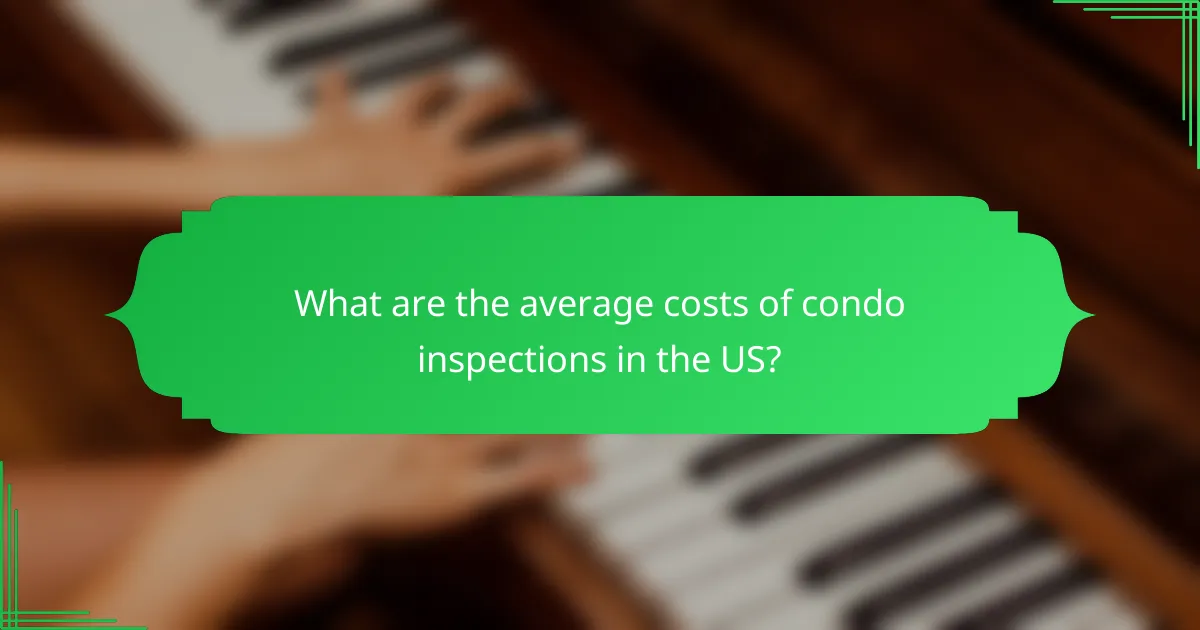
What are the average costs of condo inspections in the US?
The average cost of condo inspections in the US typically ranges from $300 to $500. This price can vary based on several factors, including the size of the condo, location, and specific services included in the inspection.
Typical price range
Most condo inspections fall within the $300 to $500 range, with smaller units generally costing less and larger or more complex properties costing more. Some inspectors may charge a flat fee, while others might base their pricing on the square footage of the condo.
Additional services, such as radon testing or mold inspections, can increase the total cost. Homebuyers should consider these potential extras when budgeting for an inspection.
Factors affecting costs
Several factors can influence the cost of a condo inspection. The size and age of the condo are significant, as larger or older properties may require more thorough evaluations. The inspector’s experience and reputation can also play a role in pricing.
Moreover, the inclusion of specialized services, such as pest inspections or thermal imaging, can add to the overall cost. It’s advisable to clarify what is included in the inspection fee upfront to avoid surprises.
Regional price variations
Prices for condo inspections can vary significantly by region. For instance, inspections in metropolitan areas or regions with a high cost of living may be on the higher end of the scale, while rural areas might offer lower rates.
In some states, additional regulations or requirements may also affect inspection costs. It’s beneficial for buyers to research local market rates and consider obtaining quotes from multiple inspectors to ensure a fair price.
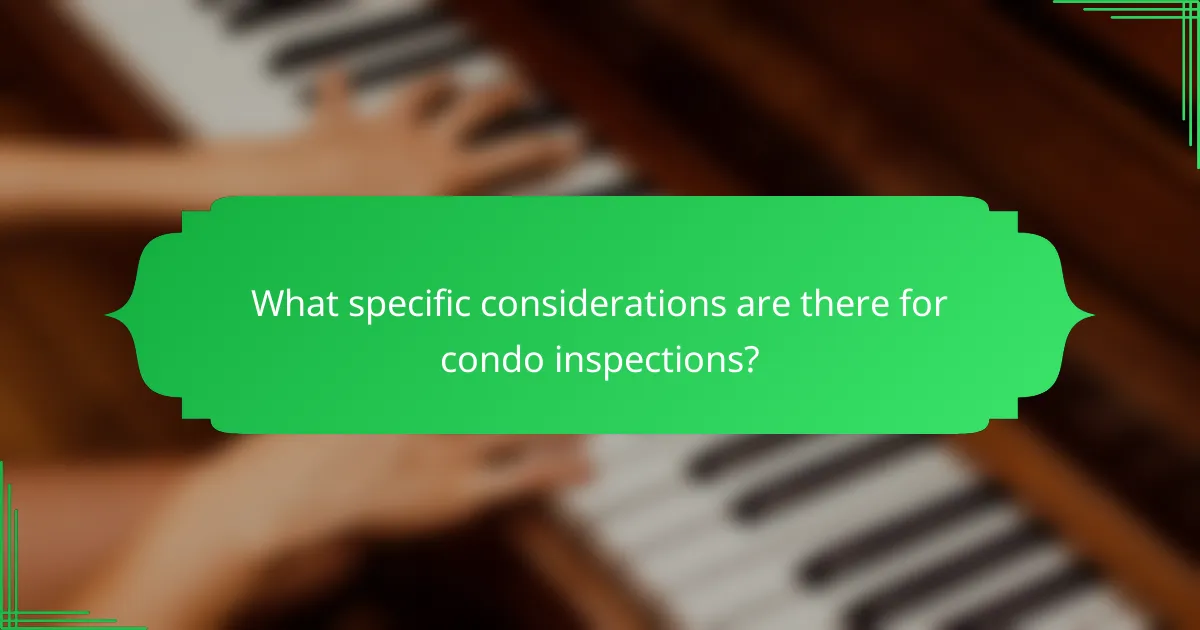
What specific considerations are there for condo inspections?
Condo inspections require attention to unique factors such as shared spaces, HOA regulations, and common structural issues. Understanding these considerations helps ensure a thorough evaluation of the property and its compliance with community standards.
Common issues in condos
Condos often face specific problems due to shared walls and communal systems. Common issues include plumbing leaks, electrical system malfunctions, and HVAC inefficiencies. Inspectors should pay special attention to these areas, as they can affect multiple units.
Additionally, look for signs of water damage or mold, particularly in basements or around windows. These issues can lead to costly repairs if not addressed promptly.
Importance of HOA regulations
Homeowners Association (HOA) regulations play a crucial role in condo inspections. These rules dictate maintenance responsibilities and standards for common areas, which can impact the overall condition of the property. Understanding these regulations helps buyers know what to expect regarding upkeep and potential costs.
Inspectors should verify that the condo complies with HOA guidelines, as non-compliance can lead to fines or required repairs. Familiarity with these regulations can also aid in negotiating repairs or improvements before purchase.
Inspection frequency recommendations
Regular inspections are vital for maintaining condo health, with recommendations suggesting inspections every few years or after significant changes, such as renovations or severe weather events. Frequent checks can catch issues early, preventing larger problems down the line.
For older condos, consider annual inspections to monitor wear and tear, especially in shared systems like plumbing and roofing. Establishing a routine inspection schedule can save owners money and ensure compliance with HOA standards.
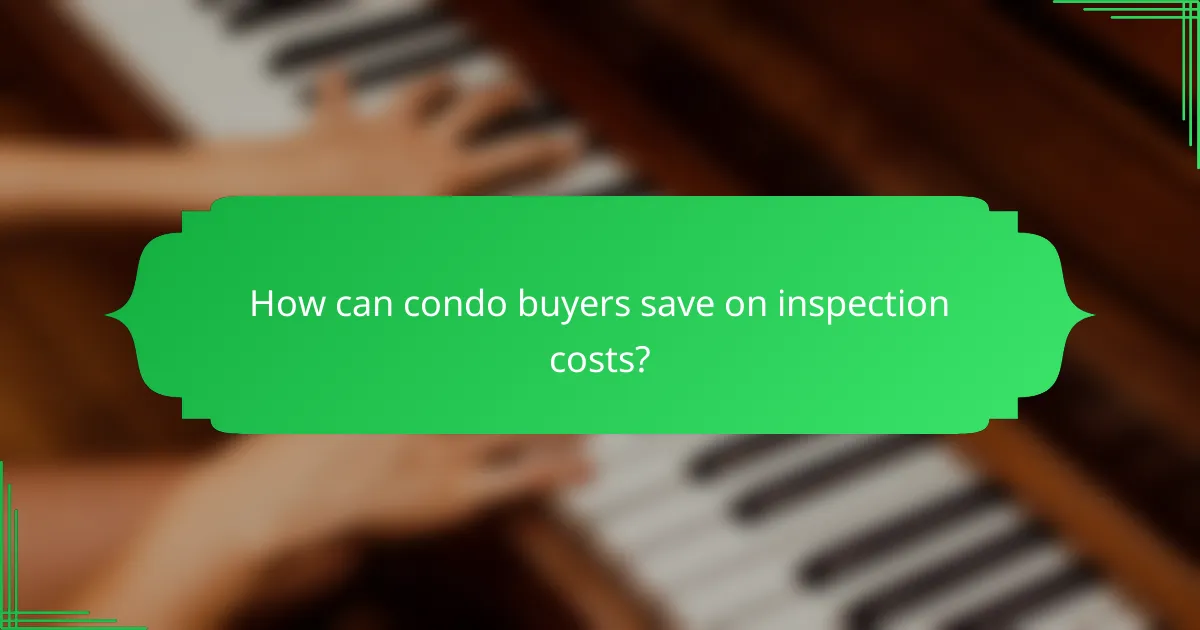
How can condo buyers save on inspection costs?
Condo buyers can save on inspection costs through negotiation, bundling services, and strategic timing. By being proactive and informed, buyers can reduce their overall expenses while ensuring a thorough inspection of their potential new home.
Negotiating inspection fees
Many inspection companies are open to negotiation, especially for condo buyers who are serious about their purchase. Start by researching typical inspection costs in your area, which can range from $300 to $600, and use this information to discuss fees with the inspector.
Consider asking for a discount if you are purchasing multiple inspections or if you can pay in cash. Some inspectors may also offer lower rates during off-peak seasons, so inquire about any available promotions.
Bundling services with other inspections
Bundling your condo inspection with other services can lead to significant savings. For instance, if you need a pest inspection or radon testing, many companies offer package deals that can reduce the total cost.
When scheduling, ask if the inspector can include additional services at a reduced rate. This not only saves money but also ensures that all necessary evaluations are completed in one visit, making the process more efficient.
Timing inspections strategically
Timing your condo inspection can impact costs and availability. Schedule inspections during weekdays rather than weekends, as many inspectors charge higher rates for weekend services. Additionally, booking during the off-peak season can lead to lower prices.
Be mindful of the real estate market trends in your area. If you notice a slowdown, you may find inspectors more willing to negotiate fees or offer discounts to secure business. Always plan ahead to ensure you have ample time for the inspection before closing.
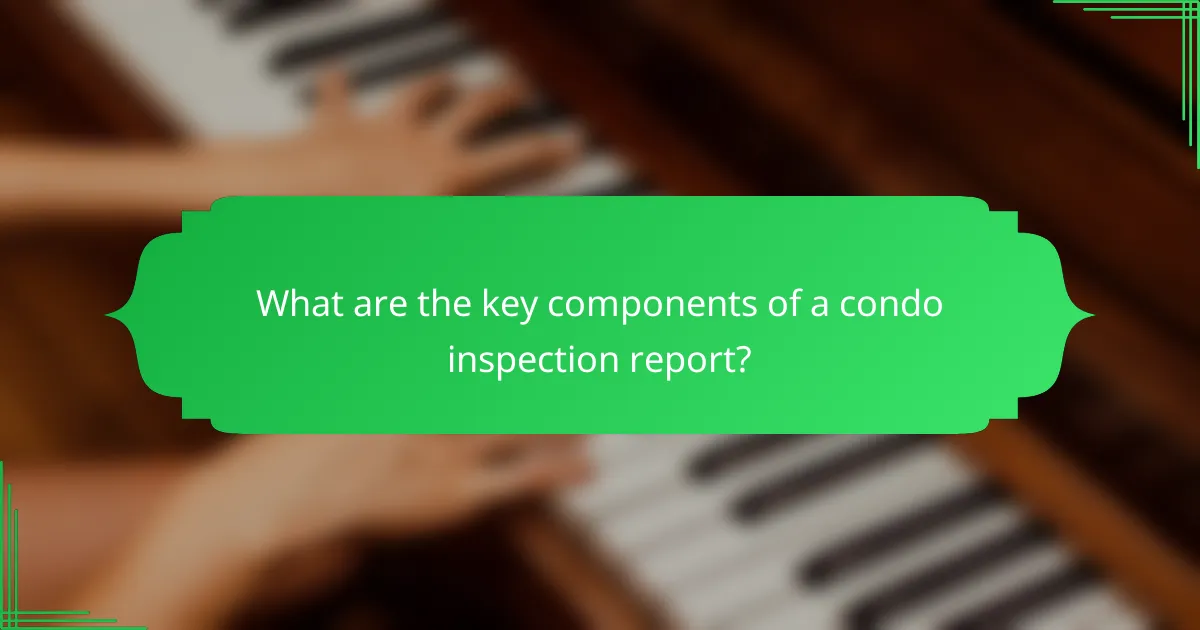
What are the key components of a condo inspection report?
A condo inspection report typically includes assessments of the property’s structural integrity, electrical systems, plumbing, and common areas. These components help identify potential issues that could affect safety, functionality, and overall value.
Structural assessments
Structural assessments focus on the condition of the building’s framework, including walls, roofs, and foundations. Inspectors look for signs of damage such as cracks, water intrusion, or settling, which can indicate serious problems.
Common tools used in structural evaluations include moisture meters and thermal imaging cameras. It’s essential to address any structural issues promptly, as they can lead to costly repairs if left unresolved.
Electrical and plumbing evaluations
Electrical evaluations assess the safety and functionality of wiring, outlets, and circuit breakers. Inspectors check for outdated systems, exposed wires, and proper grounding to ensure compliance with local codes.
Plumbing evaluations involve inspecting pipes, fixtures, and water heaters for leaks, corrosion, and adequate water pressure. Regular maintenance and timely repairs can prevent significant water damage and costly replacements.
Common findings and implications
Common findings in condo inspections include outdated electrical systems, plumbing leaks, and structural deficiencies. Each of these issues can have serious implications for safety and maintenance costs.
Addressing these findings early can save homeowners considerable expenses down the line. Buyers should negotiate repairs or price adjustments based on the inspection report to ensure they are not left with unexpected costs after purchase.

What are the benefits of hiring a certified inspector?
Hiring a certified inspector provides peace of mind and ensures that a thorough assessment of the condo’s condition is conducted. Certified inspectors have the training and experience to identify potential issues that may not be visible to the untrained eye, helping buyers make informed decisions.
Qualifications of certified inspectors
Certified inspectors typically hold credentials from recognized organizations, such as the International Association of Certified Home Inspectors (InterNACHI) or the American Society of Home Inspectors (ASHI). These qualifications often require passing rigorous exams and completing continuing education courses to stay updated on industry standards.
In addition to formal training, many inspectors have backgrounds in construction, engineering, or architecture, giving them a comprehensive understanding of building systems and potential issues. This expertise is crucial for accurately assessing the condition of a condo.
Advantages of professional expertise
Professional inspectors bring a wealth of knowledge and experience to the table, which can significantly benefit condo buyers. They know what to look for in terms of structural integrity, plumbing, electrical systems, and potential environmental hazards.
Moreover, certified inspectors often use advanced tools and technology to detect problems that may not be immediately visible, such as moisture intrusion or pest infestations. Their detailed reports can highlight urgent repairs and maintenance needs, helping buyers prioritize their investments.
Impact on buyer confidence
Having a certified inspector evaluate a condo can greatly enhance buyer confidence. Knowing that a professional has thoroughly examined the property allows buyers to proceed with their purchase without the fear of hidden defects.
Additionally, a well-documented inspection report can serve as a valuable negotiation tool. Buyers can use the findings to request repairs or price adjustments, ensuring they make a sound investment in their new home.
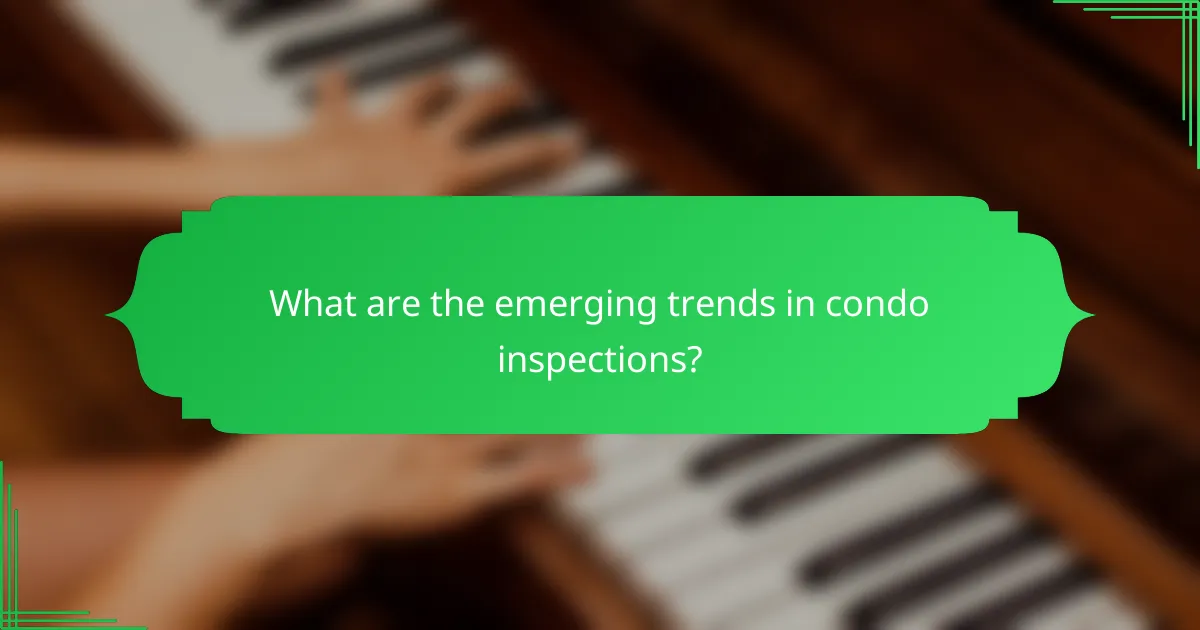
What are the emerging trends in condo inspections?
Emerging trends in condo inspections focus on integrating technology and sustainability into the process. These advancements aim to enhance efficiency, accuracy, and environmental responsibility in property evaluations.
Use of technology in inspections
The use of technology in condo inspections has significantly transformed how properties are evaluated. Tools such as drones, thermal imaging cameras, and inspection software allow inspectors to gather data more efficiently and accurately.
For instance, drones can easily access hard-to-reach areas, while thermal imaging helps identify insulation issues or moisture problems that may not be visible to the naked eye. This technology can reduce inspection time and improve the quality of findings.
When hiring an inspector, ask about the technologies they utilize. Inspectors who leverage advanced tools may charge higher fees, but the benefits often outweigh the costs in terms of thoroughness and reliability.
Increased focus on sustainability
There is a growing emphasis on sustainability during condo inspections, reflecting broader environmental concerns. Inspectors are increasingly assessing energy efficiency, water usage, and the overall ecological impact of a property.
Common sustainability checks include evaluating insulation quality, HVAC systems, and the presence of energy-efficient appliances. These factors can influence not only the living experience but also long-term utility costs for residents.
Property buyers should prioritize inspectors who are knowledgeable about green building practices and sustainability standards. This focus can lead to potential savings on energy bills and contribute to a healthier living environment.
